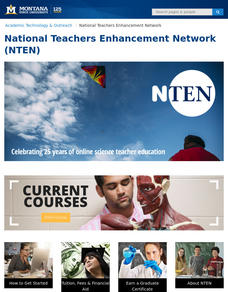Curated OER
Newport Weather Project
Learners study weather and climate patterns using computer and Internet resources. They collect temperature information and share it with other classes via e-mail using graphs
Curated OER
Los Volcanes Mexicanos
Students conduct Internet research on Mexican volcanoes. They explore various websites, complete a website worksheet, answer questions in Spanish, and create a timeline of a volcano's eruptions.
Curated OER
The Prado Museum
Students visit the Prado Museum website. They explore the website, answer questions in Spanish, interview a classmate, and compare/contrast various artists' works and the Prado museum with a U.S. museum.
Curated OER
Museums, Museums, Museums!
Students explore the websites for museums in either Paris or Madrid. They complete a website worksheet, answer questions about each museum, and create an ad for one of the museums.
Curated OER
Bugs Every Which Way
Students, after gathering information about insects through observation and the internet, explore and examine tiny insects that crawl through a magnifying glass and then draw their favorite bugs from different angles. They create a...
Curated OER
Teaching About Freedom of Speech on the Internet
Students explore the first amendment in relation to their own personal use of the internet and discuss the legal implications that occur when schools and libraries put filters on computers to restrict access to certain websites.
Curated OER
What Is Hyperbolic Geometry?
Ninth graders discuss the concept of hyperbolic geometry. They complete Internet geometry activities and write essays comparing and contrasting hyperbolic geometry to Euclidean geometry.
NOAA
What's the Big Deal?
Who knew that a possible answer to Earth's energy resource problems was lurking deep beneath the ocean's surface? Part four of a six-part series introduces Earth Science pupils to methane hydrate, a waste product of methanogens. After...
Curated OER
Systems 1: Simple Machines
Students explore the parts of a system and develop schema of the interactions between those parts. They examine a variety of simple hardware devicesand observe the interactions between the elements of the devices, through both hands-on...
Curated OER
I Robot, Can Do That
Students examine how underwater robots can be used to assist scientific explorations. They read and discuss an article, conduct Internet research, complete a worksheet, and present an oral report.
Curated OER
I, Robot, Can Do That!
Students describe underwater robots. In this robot lesson, students describe and contrast three types of underwater robots used for scientific exploration. This lesson includes several activities, a handout, background data, and multiple...
Alabama Learning Exchange
Exploring Explorers
Students gather information about a 15th to 17th century explorer and prepare a script in talk show format about the individual. Finally, students make a video following the script and present it to the class.
Curated OER
Saris, Kimonos, Tagas and Smocks: Exploring Clothing Across Cultures
Learners explore via the internet all types of clothing around the world. Students discuss that the way people dress is an important means of expressing identity. Learners collaborate via Internet research the social purposes of clothing.
Curated OER
Exploration: Writing Research Papers
Students use the Internet to search for model research papers, analyze the style of introductions. They write an introduction to a research paper on European explorers. This research project may be completed individually or with students...
Curated OER
Exploring Weather Websites
Learners research and locate their own weather data using a weather website. They examine how to locate valid information on the www.weather.com website, and explore the website. Next, they select a city they want to visit, and compare...
Curated OER
An Exploration of Automotive Design
students research varied aspects of car design, and create a new design for the exterior body of a car. Students conduct Internet research, respond to writing prompts, and analyze, evaluate and synthesize information from multiple...
Curated OER
Exploring Corporate Codes of Conduct
Students use the Internet to analyze and compare corporate codes of conduct of Canadian companies.
Curated OER
Exploring the USA and the World with Cartograms
Middle schoolers investigate cartograms in order to explore the different countries on Earth. In this world geography activity, students use the Internet to analyze data on different cartograms. Middle schoolers compare data, such as...
Curated OER
Exploring the Solar System
Students are introduced to the nine planets and countless moons of the solar system. Using the internet, they research one of the planets to determine if a manned mission to the planet would be possible. They share their information...
TryEngineering
Search Engines
Learn how to find things quickly and efficiently on the Internet. The lesson teaches how search engines work and how to efficiently use them. It includes an activity where groups develop search queries to find sites using given criteria.
Curated OER
Discovering Differences Between Internet Search Engines
Students explore the differences in search engines available on the Internet. Most users are unaware of the differences between search engines. Some sample larger or smaller portions of the World Wide Web than others.
Curated OER
The History of Paper Money
Pupils research the history of paper money using the Internet in order to answer questions and create their own bills.
Curated OER
High-end/Low-end: Exploring Price and Value in Design
Students analyze elements of design and compare/contrast elements of price and design. In this design lesson, students consider the differences between high-end and low-end design. After completing an analysis of design in small groups,...
Curated OER
Finding Your Way in the World Wide Web
Researchers practice grouping items to explore the concept of a database. They apply these concepts to the WWW search engine format and consider why it is important to enter the most specific information.

























